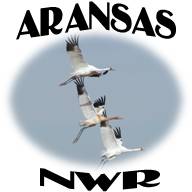Flock Status – April 2008
| Wild Populations | Adult | Young | Total | Adult Pairs |
| Aransas / Wood Buffalo NP | 227 | 39A | 266A | 69 |
| Rocky Mountains | 0 | 0 | 0 | 0 |
| Florida (Non-Migratory) | 36B | 1 | 37B | 13 |
| Wisconsin/Florida (Eastern-Migratory) | 52 | 22C | 74D | 4 |
| Subtotal (Wild) | 315 | 62 | 377 | 90 |
| A A record 84 chicks hatched from 65 nests in 2007. Forty chicks fledged. The peak flock size of the Aransas-Wood Buffalo population is estimated at 266, including 39 juveniles.
B This number reflects the birds regularly monitored in Florida. A few additional cranes could be present in unknown locations. One chick fledged in the wild in 2007. C The 5 whooping crane breeding facilities (Patuxent Wildlife Research Center, International Crane Foundation, Calgary Zoo, San Antonio Zoo, and Species Survival Center in New Orleans) all either provided eggs or hatched and raised chicks in 2007. Two eggs came from a wild nest in Florida and 2 eggs came from wild nests in Wisconsin. Twenty-eight chicks were raised in captivity and shipped to the Necedah NWR in central Wisconsin for later reintroduction. Seventeen were led by ultralight to Florida, and 10 were released with other wild cranes in central Wisconsin. Four of the 10 have died, and one juvenile ultralight crane died in TN in the spring migration. D The flock total includes 3 adults that have not been sighted for some time and are considered “missing”. |
||||
| Captive Populations | Adult | Young* | Total | Breeding
Pairs |
| Patuxent WRC, Maryland | 60 | 3 | 63 | 13 |
| International Crane Foundation, WI | 35 | 0 | 35 | 11 |
| Devonian WCC / Calgary Zoo | 20 | 2 | 22 | 6 |
| Survival Ctr., Belle Chasse | 9 | 0 | 9 | 1 |
| Calgary Zoo, Alberta | 2 | 0 | 2 | 0 |
| New Orleans Zoo | 2 | 0 | 2 | 0 |
| San Antonio Zoo | 7 | 0 | 7 | 1 |
| Homosassa Springs Wildlife State Park | 2 | 0 | 2 | 0 |
| Lowery Park Zoo, FL | 1 | 0 | 1 | 0 |
| Jacksonville Zoo, Florida | 2 | 0 | 2 | 0 |
| Milwaukee Co. Zoo, Wisconsin | 1 | 0 | 1 | 0 |
| Subtotal (Captive) | 141 | 5 | 146 | 32 |
| * Numbers are of young remaining at the captive center after eggs and/or birds were shipped out for reintroductions programs. In most cases, these young are genetically valuable and will become future captive breeding stock. | ||||
| Wild | Captive | TOTAL | ||
| TOTAL (wild + captive) | 377 | 146 | 523 | |

